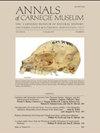爱荷华中北部吉尔摩城组(下密西西比)的腹足类动物:第1部分:bellerophonto总科和euomphalo总科的地质学和系统学
IF 0.9
4区 地球科学
Q4 PALEONTOLOGY
引用次数: 0
摘要
爱荷华州中北部的Gilmore City组代表了一个向上浅滩的碳酸盐岩序列,其下部为正常海相,上部为推进的鲕粒浅滩。在大多数暴露的地层中,包含了丰富多样的动物群,这些动物群被用于几次将吉尔摩城与密西西比类型剖面联系起来的尝试。生物地层对比结果表明,Gilmore City组跨越Kinderhook-Osage边界,在密西西比型剖面上处于不整合的位置。吉尔摩城的化石实际上与科迪勒兰的动物比与中大陆的动物更接近。腹足类动物是Gilmore City地层中最丰富、最多样化的动物元素之一,由超过75种组成,代表了大约50个属和亚属。这第一部分只讨论bellerophonto总科和euomphalo总科。描述和插图的物种包括Bellerophon (Bellerophon) panneus White, 1862, Bellerophon (Bellerophon) meeki?Koninck, 1883, Waagenella spergenensis (Gordon and Yochelson, 1983), Waagenella sp. cf. Waagenella spergenensis (Gordon and Yochelson, 1983), Waagenella sp. indet。, Retispira sp. cf. Retispira exilis (Koninck, 1883)和Euphemites rollinsi,新种;以及春绵蛛科(Euomphalus springvalensis White, 1877a)、白绵蛛(Euomphalus luxus White, 1877b)、白绵蛛(Euomphalus ammon White and Whitfield, 1862)、新种obparaparollus obtectus和异螺旋体(Serpulospira paradoxus) (Winchell, 1864)。本文章由计算机程序翻译,如有差异,请以英文原文为准。
Gastropods of the Gilmore City Formation (Lower Mississippian) of North-Central Iowa: Part 1, Geology and Systematics of Bellerophontoidea and Euomphaloidea
ABSTRACT The Gilmore City Formation of north-central Iowa represents an upward-shoaling sequence of carbonate rocks ranging from normal marine conditions in the lower portion of the section to prograding oolite shoals at the top. At most exposures, the formation contains an abundant and diverse fauna that has been used in several attempts to correlate the Gilmore City with the Mississippian type section. Results of biostratigraphic correlation indicate that the Gilmore City Formation spans the Kinderhook-Osage boundary, occupying a position that, in the Mississippian type section, is represented by an unconformity. Gilmore City fossils actually have closer affinities with Cordilleran faunas than with those of the Midcontinent.The gastropods constitute one of the most abundant and diverse faunal elements of the Gilmore City Formation, consisting of more than 75 species representing about 50 genera and subgenera. This first part deals only with the Bellerophontoidea and Euomphaloidea. Described and illustrated species include the bellerophontoideans Bellerophon (Bellerophon) panneus White, 1862, Bellerophon (Bellerophon) meeki? Koninck, 1883, Waagenella spergenensis (Gordon and Yochelson, 1983), Waagenella sp. cf. Waagenella spergenensis (Gordon and Yochelson, 1983), Waagenella sp. indet., Retispira sp. cf. Retispira exilis (Koninck, 1883), and Euphemites rollinsi, new species; and the euomphaloideans Euomphalus springvalensis White, 1877a, Euomphalus luxus White, 1877b, Euomphalus ammon White and Whitfield, 1862, Straparollus obtectus, new species, and Serpulospira paradoxus (Winchell, 1864).
求助全文
通过发布文献求助,成功后即可免费获取论文全文。
去求助
来源期刊

Annals of Carnegie Museum
综合性期刊-动物学
CiteScore
2.50
自引率
18.20%
发文量
4
审稿时长
>12 weeks
期刊介绍:
Annals of Carnegie Museum is a quarterly journal that publishes peer-reviewed short and medium-length original scientific contributions in organismal biology, earth sciences, and anthropology, in 40 by 52.5 pica format (168 by 220 mm or 6-5/8 by 8-5/8 inches). Subject matter must be relevant to Carnegie Museum of Natural History scientific sections or Powdermill Nature Reserve (PNR), preferably with connection to the Carnegie collection and/or personnel. Carnegie Museum staff and research associates receive publication priority, but others are encouraged to submit papers, especially those manuscripts explicitly based on the Carnegie collection.
 求助内容:
求助内容: 应助结果提醒方式:
应助结果提醒方式:


